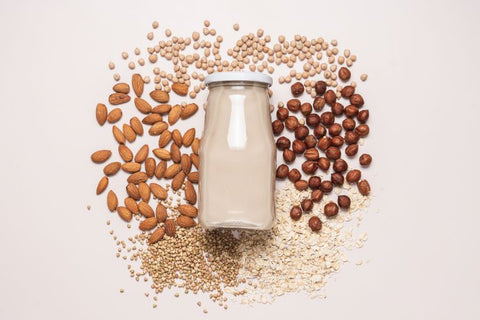Kidney health stands as a cornerstone of overall well-being, vital for maintaining the body's internal balance and filtering out toxins. The impact of diet on kidney function is profound, influencing its efficiency and longevity. In this article, we delve into the significance of kidney health and explore the intricate relationship between diet and kidney function. By examining various aspects such as protein sources, nutrient balance, and inflammatory factors, we aim to shed light on how dietary choices can either bolster or compromise kidney health.
Lower Risk of Kidney Stones
Diet can play a significant role in managing kidney stone risk. Here's what you need to know about protein sources and how they can impact your chances of developing stones:
- Lower Risk: Studies suggest that plant-based proteins and dairy proteins may be associated with a reduced risk of kidney stones. Beans, lentils, nuts, seeds, and low-fat dairy products are all good options.
- Higher Risk: On the other hand, a high intake of red meat, processed meats, and other non-dairy animal proteins might increase your risk. Moderation is key with these sources.
Reduced Acid Load
Protein sources can be categorized by their impact on the body's acid-base balance, which is measured by a value called Potential Renal Acid Load (PRAL). Here's the breakdown:
- High Acid Load: Animal proteins like meat, poultry, eggs, and cheese tend to have a high PRAL. When your body metabolizes these proteins, it produces more acid that needs to be excreted by the kidneys.
- Low Acid Load: Plant-based proteins like legumes (beans, lentils), nuts, seeds, and some vegetables generally have a low PRAL. They either create an alkaline effect or a minimal acid load on the body.
There's some ongoing research on the exact impact of dietary acid load on kidney stones, but some studies suggest a high-acid diet may contribute to their formation.
Adequate Amino Acid Profile
Kidneys are amazing filtration machines, constantly working to keep your blood clean and balanced. Amino acids, the building blocks of protein, play a vital role in this process. Let's explore how amino acids contribute to healthy kidney function:
- Kidney Function: The kidneys themselves are constantly using amino acids for the repair and maintenance of their tissues. An adequate supply ensures the kidneys can function optimally.
- Waste Product Removal: The kidneys filter waste products from the blood, and some of these wastes come from the breakdown of amino acids. Having a balanced amino acid intake helps the kidneys manage this filtration process efficiently.
- Muscle Health: Amino acids are also essential for maintaining muscle health. In chronic kidney disease, muscle breakdown can become a concern. Ensuring a good amino acid profile can help support muscle health and potentially slow muscle loss.
Lower Phosphorus Content
Phosphorus is a mineral that plays a vital role in bone health and many other bodily functions. However, for people with certain health concerns, managing phosphorus intake becomes important. Here's how plant-based and animal-based proteins differ in their phosphorus content:
- Animal Protein: Packs a bigger phosphorus punch. These sources are generally higher in overall phosphorus content, and our bodies efficiently absorb most of it.
- Plant-Based Protein: Lower in phosphorus and less absorbable. While plant-based proteins may contain phosphorus, the amount is typically lower. Additionally, our bodies have a harder time absorbing this plant-based phosphorus, offering a potential benefit for those needing to manage phosphorus intake.
For individuals with kidney issues, particularly chronic kidney disease (CKD), phosphorus content in their diet becomes quite important. Here's why:
- Limited Filtration: Healthy kidneys efficiently remove excess phosphorus from the blood. However, with CKD, this filtration capacity weakens. As a result, phosphorus levels can build up in the bloodstream.
- Bone Health Issues: High blood phosphorus can pull calcium out of bones, making them weak and brittle. This can lead to bone disease and increase the risk of fractures.
- Cardiovascular Risks: Studies suggest high phosphorus levels may contribute to increased risk of heart disease and blood vessel calcification in people with CKD.
Therefore, managing phosphorus intake becomes a crucial part of managing CKD and preventing associated complications. By limiting phosphorus from their diet, individuals with kidney issues can help:
- Maintain Bone Health: Reduce the risk of bone mineral loss and fractures.
- Protect Cardiovascular System: Potentially lower the risk of heart disease and blood vessel issues.
- Support Overall Kidney Function: This may help slow the progression of CKD.
Heart Health Benefits
Plant-based diets have emerged as a powerful ally for heart health, and for good reason. Here's a dive into how incorporating more plant-based options can nurture a healthier heart:
- Curbing Saturated Fat: Animal products are often loaded with saturated fat, which can elevate LDL cholesterol, the "bad" cholesterol. Plant-based diets tend to be naturally lower in saturated fat, promoting a more favorable cholesterol profile.
- Fiber for the Win: Fruits, vegetables, legumes, and whole grains are the backbone of a plant-based diet, and they're all packed with fiber. This soluble fiber acts like a broom in your digestive system, sweeping away LDL cholesterol and lowering its levels.
- Blood Pressure Benefits: Plant-based meals are typically lower in sodium and brimming with potassium and magnesium. These minerals work together to regulate blood pressure, a key player in heart health.
- Weight Management: Plant-based diets often have a calorie and fat advantage compared to meat-heavy options. This can contribute to healthy weight management, another important factor for a healthy heart.
- Antioxidant Powerhouse: Many plant-based foods like fruits, vegetables, nuts, and seeds are rich in antioxidants. These antioxidants combat inflammation and protect cells from damage, both of which are linked to the development of heart disease.
The connection between a plant-based diet and heart health can indirectly benefit kidney health in a few ways:
- Improved Blood Pressure Control: As mentioned earlier, plant-based diets are typically lower in sodium and rich in potassium and magnesium, all of which help regulate blood pressure. High blood pressure is a major risk factor for both heart disease and chronic kidney disease (CKD). By managing blood pressure through diet, you can help reduce the strain on your kidneys and potentially slow the progression of CKD.
- Reduced Risk of Diabetes: A plant-based diet can also help with weight management and blood sugar control, both of which are important for preventing type 2 diabetes. Diabetes is a leading cause of CKD, so reducing your risk of diabetes through diet can indirectly protect your kidney health.
- Antioxidant Advantage: The anti-inflammatory properties of antioxidants found in plant-based foods can also be beneficial for the kidneys. Chronic inflammation is a risk factor for various health issues, including CKD. By consuming a diet rich in antioxidants, you may help reduce inflammation throughout the body, potentially offering some protection for your kidneys.
Lower Saturated Fat Content
Plant-based protein sources generally contain much lower levels of saturated fat compared to animal-based protein sources. Here's a breakdown:
- Plant-Based Proteins: Legumes (beans, lentils), nuts, seeds, tofu, tempeh, whole grains - These sources are naturally low in saturated fat and often contain heart-healthy unsaturated fats like polyunsaturated and monounsaturated fats.
Higher Saturated Fat:
- Based Proteins: Red meat (beef, lamb, pork), poultry (with skin), processed meats (sausages, hot dogs), full-fat dairy products - These sources can be high in saturated fat, particularly depending on the cut of meat and fat content of dairy products.
Here's the key difference
Saturated fat from animal sources can raise LDL ("bad") cholesterol levels, increasing the risk of heart disease. Plant-based proteins generally don't contain cholesterol and have a minimal impact on LDL levels.
Exceptions
It's important to note that some plant-based sources, like coconut and palm kernel oil, are high in saturated fat. However, these are typically consumed in smaller quantities compared to animal protein sources.
Balanced Nutrient Intake
Plant-based protein powders can be a helpful tool for incorporating more protein into a well-balanced diet, especially for those following a vegan, vegetarian, or flexitarian lifestyle. Here's how they can contribute:
- Boost Protein Intake: These powders offer a concentrated source of protein from plants like soy, pea, brown rice, or hemp. This can be particularly beneficial for people who struggle to get enough protein from whole food sources alone.
- Nutrient Diversity: While some powders focus on a single protein source, many combine protein from several plants. This provides a more complete amino acid profile, the building blocks of protein. Some powders are also fortified with vitamins, minerals, and even fiber, adding to their nutritional value.
- Convenience: Protein powders are a quick and easy way to add a protein boost to your diet. You can mix them into smoothies, yogurt, or oatmeal, or use them for baking protein bars or pancakes.
However, it's important to remember they are supplements, not replacements for a healthy diet:
- Whole Food Base: Focus on getting protein from a variety of whole food sources like legumes, nuts, seeds, and whole grains. These offer other essential nutrients like fiber, healthy fats, and vitamins that powders may lack.
- Consider Sweeteners: Be mindful of the added sugar content in some powders. Look for options with minimal added sugar or natural sweeteners like stevia.
- Not a Magic Bullet: Protein powders won't magically improve your health or fitness. They work best when combined with a well-rounded diet and exercise routine.
Inflammation Reduction
Plant-based protein powders can potentially play a supportive role in reducing inflammation, but it's important to understand their limitations:
Potential Anti-inflammatory Effects:
- Plant-Based Sources: Many plant-based protein powders are derived from sources like peas, beans, lentils, brown rice, and hemp. These sources may contain naturally occurring anti-inflammatory compounds like phytonutrients and antioxidants.
- Specific Ingredients: Some protein powders are specifically formulated with anti-inflammatory ingredients like turmeric, tart cherry, or green tea extract. These can offer additional benefits.
However, consider these factors:
- Limited Impact: The amount of anti-inflammatory compounds in protein powders is likely to be lower compared to getting them directly from whole food sources.
- Processing: Processing during powder production can sometimes diminish the anti-inflammatory potential of some plant-based ingredients.
- Focus on Whole Foods: For a more significant anti-inflammatory effect, prioritize incorporating a variety of whole, unprocessed plant-based foods in your diet.
Blood Pressure Management
Plant-based diets have a well-established reputation for promoting healthy blood pressure. Here's a breakdown of the key factors contributing to this benefit:
Lower Sodium Intake: Plant-based meals are naturally lower in sodium compared to animal products like processed meats and cured cheeses. High sodium intake is a major culprit for high blood pressure.
Potassium and Magnesium: These minerals act as natural vasodilators, relaxing blood vessels and promoting smooth blood flow. This ultimately leads to lower blood pressure. Fruits, vegetables, legumes, and nuts are all abundant plant-based sources of potassium and magnesium.
Reduced Saturated Fat: Plant-based proteins tend to be lower in saturated fat compared to animal proteins. Saturated fat can contribute to inflammation and arterial stiffness, both of which can elevate blood pressure.
Weight Management: Plant-based diets are often lower in calories and fat, which can support healthy weight management. Excess weight puts a strain on the heart and circulatory system, contributing to high blood pressure.
Multiple studies have shown that following a plant-based diet can lead to significant reductions in both systolic and diastolic blood pressure. This translates to a lower risk of developing heart disease and stroke, both highly associated with high blood pressure.
Individual Variability
Not everyone reacts the same way to food. While there are healthy eating guidelines that benefit most people, it's important to consider individual responses to dietary choices. Here's why:
- Biochemistry: We all have unique microbiomes, which are the communities of trillions of bacteria living in our gut. These bacteria play a crucial role in digestion, nutrient absorption, and even immune function. Different microbiomes can react differently to the same foods, meaning one person might thrive on a certain diet while another might experience digestive issues.
- Genetics: Our genes influence how our bodies process nutrients and respond to certain foods. For example, some people have a genetic predisposition for lactose intolerance, so they would need to tailor their diet accordingly.
- Health conditions: Certain medical conditions can necessitate dietary modifications. People with diabetes, for instance, need to manage their blood sugar levels through their diet, while those with heart disease might benefit from a diet low in saturated fat.
When it comes to dietary advice, there's a wealth of information available. However, it's important to remember that one-size-fits-all approaches rarely work best. Our bodies have unique needs and respond differently to food. This is where consulting a healthcare professional for personalized dietary recommendations becomes valuable.
Conclusion
In summary, incorporating plant-based protein powders offers numerous benefits for kidney health. These include a lower risk of kidney stones, reduced acid load, adequate amino acid profiles, lower phosphorus content, and support for heart health and blood pressure management. By opting for plant-based protein sources, individuals can also reduce saturated fat intake and inflammation, further safeguarding their kidney function.
To enhance overall well-being through informed dietary choices, individuals should prioritize a balanced diet rich in nutrient-dense foods, including plant-based protein sources. Consulting healthcare professionals for personalized recommendations based on individual health conditions and dietary preferences is essential. By making conscious decisions about their dietary intake, individuals can proactively support their kidney health and contribute to their overall wellness.





